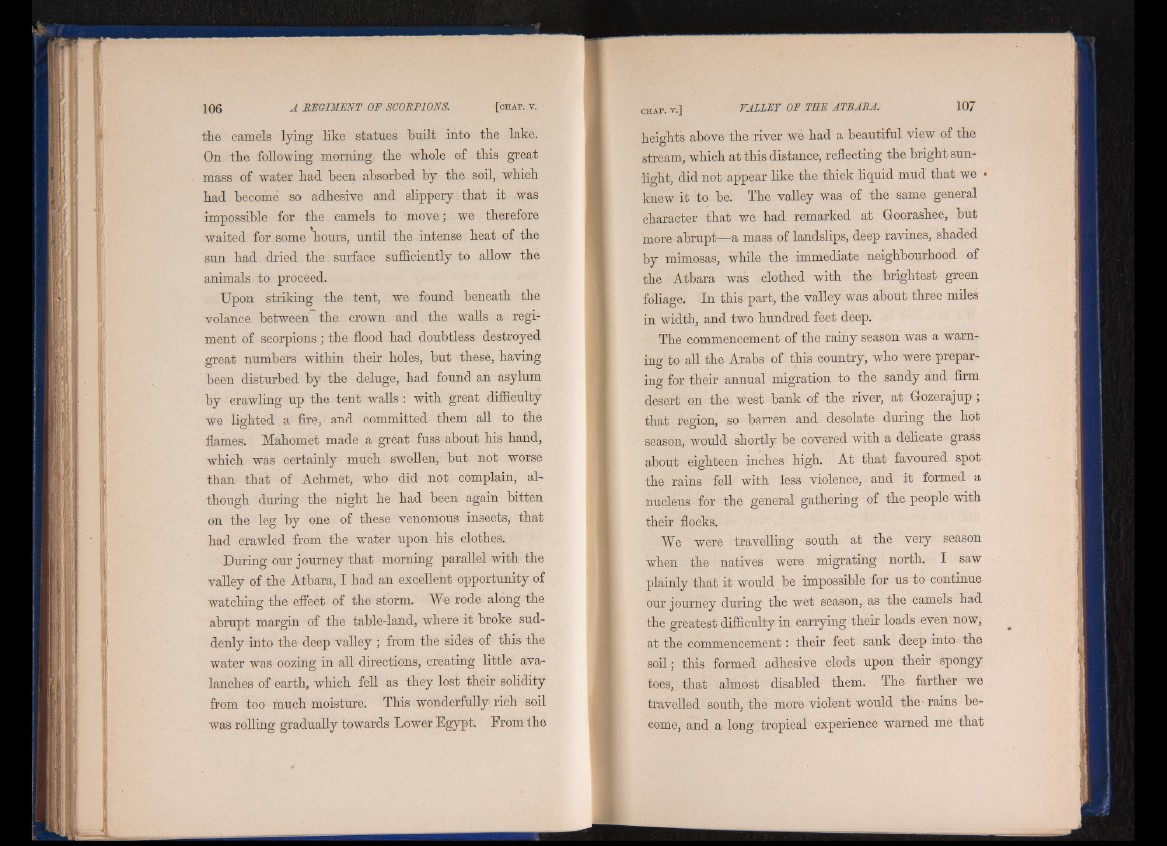
the camels lying like statues built into the lake.
On the following morning the whole of this great
mass of water had been absorbed by the soil, which
had become so adhesive and slippery. that it was
impossible for the camels to move; we therefore
waited for some 'hours, until the intense heat of the
sun had dried the surface sufficiently to allow the
animals to proceed.
Upon striking the tent, we found beneath the
volance between the crown and the walls a regiment
of scorpions; the flood had doubtless destroyed
great numbers within their holes, but these, having
been disturbed by the deluge, had found an asylum
by crawling up the tent walls : with great difficulty
we lighted a fire, and committed them all to the
flames. Mahomet made a great fuss about his hand,
which was certainly much swollen, but not worse
than that of Achmet, who did not complain, although
during the night he had been again bitten
on the leg by one of these venomous insects, that
had crawled from the water upon his clothes.
During our journey that morning parallel with the
valley of the Atbara, I had an excellent opportunity of
watching the effect of the storm. We rode along the
abrupt margin of the table-land, where it broke suddenly
into the deep valley ; from the sides of this the
water was oozing in all directions, creating little avalanches
of earth, which fell as they lost their solidity
from too much moisture. This wonderfully rich soil
was rolling gradually towards Lower Egypt. From f he
heights above the river we had a beautiful view of the
stream, which at this distance, reflecting the bright sunlight,
did not appear like the thick liquid mud that we *
knew it to be. The valley was of the same general
character that we had remarked at Goorashee, but
more abrupt—a mass of landslips, deep ravines, shaded
by mimosas, while the immediate neighbourhood of
the Atbara was clothed with the brightest green
foliage. In this part, tie valley Was about three miles
in width, and two hundred feet deep.
The commencement of the rainy season was a warning
to all the Arabs of this country, who were preparing
for their annual migration to the sandy and firm
desert on the west bank of the river, at Gozerajup ;
that region, so barren and desolate during the hot
season, would shortly be covered with a delicate grass
about eighteen inches high. At that favoured spot
the rains fell with less violence, and it formed a
nucleus for the general gathering of the people with
their flocks.
We were travelling south at the very season
when the natives were migrating north. I saw
plainly that it would be impossible for us to continue
our journey during the wet season, as the camels had
the greatest difficulty in carrying their loads even now,
at the commencement : their feet sank deep into the
soil ; this formed adhesive clods upon their spongy
toes, that almost disabled them. The farther we
travelled south, the more violent would the-rains become,
and a long tropical experience warned me that